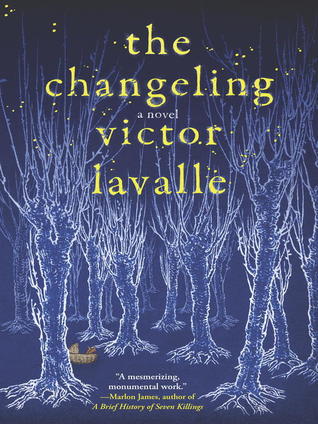Today I'm looking at a novel by Victor La Valle that is only loosely, loosely defined as fantasy and even then I'm not sure if it counts. This book is mundane for basically three-quarters of its total length and when magic is finally inserted in the last fourth of the book it left me wondering if what they'd encountered actually was magic or if it was a hallucination shared by the characters. That's honestly my biggest frustration with this novel, it's classified as a ''fantasy'' novel, but it's so freaking mundane that I don't think it's worth the effort if you're a big fantasy fan.
I'm actually going to do something that I usually avoid in my reviews and include the blurb from the back of the book for this story. I remember being intrigued by the blurb when I looked at this on the library's website so this was a major reason I bothered with this book in the first place:
''Apollo Kagwa has had strange dreams that have haunted him since childhood. An antiquarian book dealer with a business called Improbabilia, he is just beginning to settle into his new life as a committed and involved father, unlike his own father who abandoned him, when his wife Emma begins acting strange. Disconnected and uninterested in their new baby boy, Emma at first seems to be exhibiting all the signs of post-partum depression, but it quickly becomes clear that her troubles go far beyond that. Before Apollo can do anything to help, Emma commits a horrific act—beyond any parent’s comprehension—and vanishes, seemingly into thin air. Thus begins Apollo’s odyssey through a world he only thought he understood to find a wife and child who are nothing like he’d imagined. His quest begins when he meets a mysterious stranger who claims to have information about Emma’s whereabouts. Apollo then begins a journey that takes him to a forgotten island in the East River of New York City, a graveyard full of secrets, a forest in Queens where immigrant legends still live, and finally back to a place he thought he had lost forever. This dizzying tale is ultimately a story about family and the unfathomable secrets of the people we love.''
Okay, so this plot summary literally, literally, describes the entire book. The major twist, Emma's horrific act, doesn't happen until about halfway into the book. And as I said, we have no evidence that magic is real until the last quarter of the book, and even then the evidence seems pretty scanty. I'm basically left thinking that perhaps this is supposed to be an entirely mundane story and the magic is how the characters understand things. That does leave a large plot hole or leaves us with the conclusion that Apollo and Emma when insane at the end of the book and they just hallucinated the ending. I'm not sure which is more possible.
This book also reminds me of a more ''literary'' novel and I say that because Apollo, the main character, is a rare book dealer and his wife, Emma, is a librarian. Authors by definition are people who enjoy books, that's why they write them. But inevitably whenever somebody wants to write a ''serious'' book it's almost guaranteed that the main character will be a writer or librarian or somebody somehow connected with books. Which would be fine, but I get the impression that Apollo doesn't really care about books. We're told that he's a consistent reader which is how he gets into the used book trade, but after that he seems to just trade in books for the money, rather than for love of books themselves.
I'm also left with multiple questions about this book. There's the character Kinder Garten who is the main antagonist of the book, except we're not given much to understand about him. Why does he go by the alias Kinder Garten? What the hell is his ideology, if any? The character is a consistent liar so we don't know what coming out out of his mouth is true. This gets even more confusing when we get to the end of the book and he's talking with people who use the words ''beta cuck'' and another one mentions white men's natural birth rights. Is he an alt-righter or isn't he? Was La Valle including these just to make the book topical and play well with critical audiences? Who are the Wise Ones? Like how did they come to be, and where and how do people find them? There are just a lot of these questions and I'm left grasping for ideas.
The result is a book that in my opinion isn't all that great. If it was trying to convince me it was a fantasy novel, it did a really bad job and left me thinking there wasn't any fantasy involved at all. This book felt like it was trying really hard to get an award of some sort. If you like the more literary sorts of novels then this book might be enjoyable for you, but this wasn't really my cup of tea.
- Kalpar


No comments:
Post a Comment